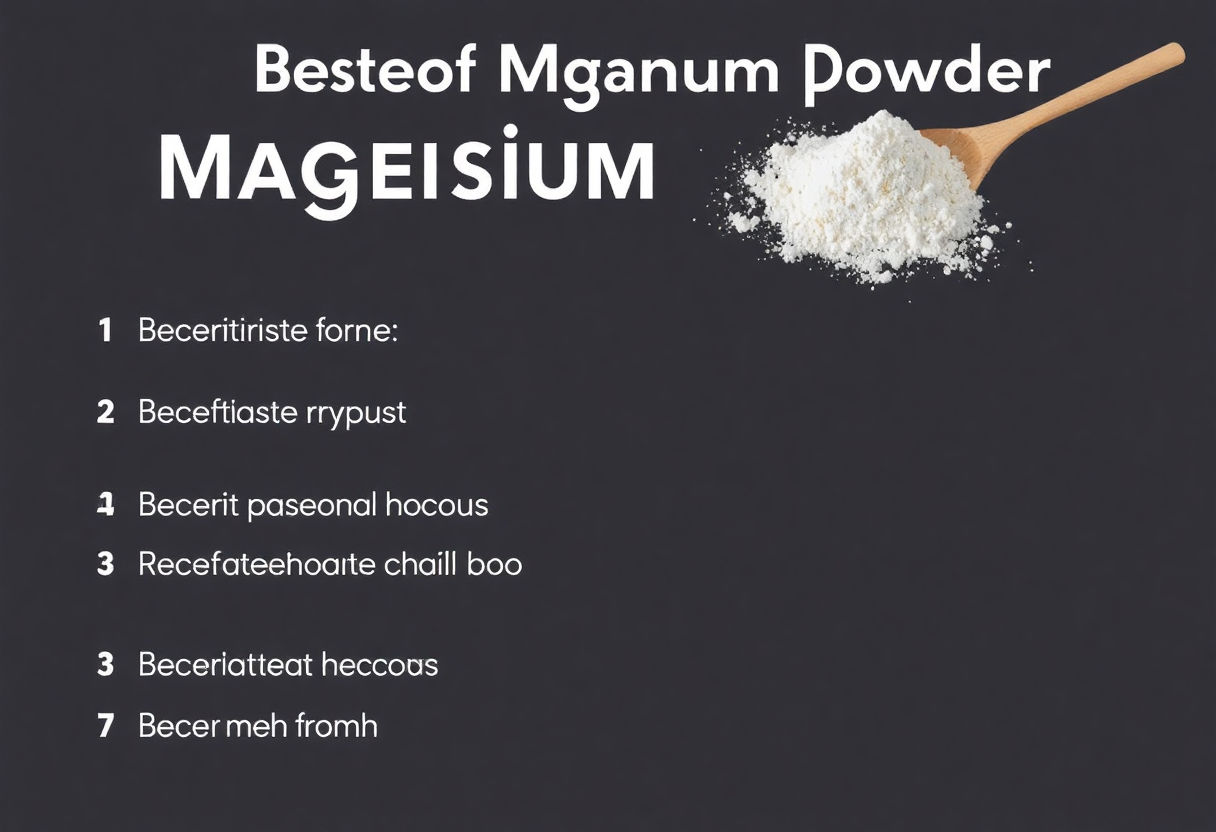Magnesium powder is emerging as a promising tool for managing anxiety and stress, areas that impact millions of lives. This article aims to explore how magnesium, a crucial mineral for numerous bodily functions, might alleviate mental health concerns. We delve into the benefits, recommended dosages, and potential side effects, offering a comprehensive view. As you read further, discover scientific insights and practical advice on incorporating magnesium powder into your wellness routine. With testimonials and expert recommendations, this resource invites you to consider magnesium’s role in your journey toward improved mental well-being.
Key Takeaways
- Magnesium powder may contribute to reducing anxiety and stress by supporting crucial bodily functions, such as nerve and muscle regulation.
- The bioavailability of magnesium powder makes it an efficient form for supplementing magnesium intake for mental health benefits.
- Recommended doses vary, but it’s important to follow expert guidance to ensure safe and effective intake for anxiety relief.
- Caution should be exercised when combining magnesium powder with other medications due to potential side effects and interactions.
- Incorporating magnesium powder with other stress management techniques can enhance its effectiveness, offering a holistic approach to stress and anxiety management.
What is Magnesium Powder?

Magnesium powder is a dietary supplement that provides an essential mineral required for numerous bodily functions. Originating from various magnesium compounds, such as magnesium citrate or magnesium glycinate, it is available in a finely milled form, making it convenient for mixing into liquids. This form of magnesium is increasingly sought after due to its ease of use and adjustable dosage options, allowing users to tailor their intake precisely.
Compared to other forms of magnesium supplements, such as tablets or capsules, magnesium powder offers distinct advantages. One of the primary benefits is its potentially higher bioavailability, meaning the body can absorb and utilize the mineral more efficiently. This can be particularly beneficial for those who may have gastrointestinal issues that impede the absorption of nutrients from pill forms.
Moreover, magnesium powder distinguishes itself with its versatility and quick assimilation in the body. Users can enjoy the flexibility of adjusting their doses more intuitively, catering to specific nutritional needs or objectives, such as stress relief or improved sleep quality. For more detailed classifications of magnesium supplements and their respective forms, you may explore various magnesium supplement types that cater to different health needs.
Incorporating magnesium powder into one’s diet can provide a convenient and potentially more effective way to ensure adequate magnesium intake, which is crucial for maintaining overall health and well-being. As with any supplement, it is recommended to consult with a healthcare professional to determine the appropriate form and dosage suited to individual health conditions and lifestyle.
The Role of Magnesium in the Body

Magnesium is a vital mineral involved in numerous bodily functions, underscoring its reputation as a nutritional powerhouse. It plays a crucial role in over 300 enzymatic processes, critical for maintaining health. Among its most notable contributions is its involvement in muscle and nerve function. By regulating muscle contractions and nerve signals, magnesium helps in maintaining a stable rhythm of heartbeats and supports the function of nerves, which is essential for movement and coordination.
Additionally, magnesium has a significant impact on blood sugar control. It aids in the transportation of blood sugar into cells and plays a role in insulin action, vital for maintaining glucose levels. Consequently, a deficiency could potentially exacerbate blood sugar management issues, which are common precursors to conditions like type 2 diabetes.
Magnesium also assists in blood pressure regulation. The mineral’s ability to aid in relaxing blood vessels contributes to reducing hypertension risks, thus supporting cardiovascular health.
The mineral’s essentiality is further highlighted by its involvement in DNA and protein synthesis. Magnesium facilitates the creation and repair of DNA and RNA, which are crucial for cell division and growth. It also contributes to the structural development of bones and is necessary for the synthesis of the antioxidant glutathione.
Further understanding of magnesium’s impact can be deeply explored through its role in cellular magnesium function. This research sheds light on how magnesium sustains cellular structures and energy transfer, underscoring its critical importance for overall health and well-being. By providing such foundational support, magnesium serves as an indispensable nutrient for bodily maintenance and disease prevention.
How Magnesium Affects Anxiety and Stress

Magnesium plays a substantial role in mental health, with scientific research highlighting its impact on anxiety and stress. Various studies suggest that magnesium can help regulate neurotransmitters and balance mood, potentially reducing the symptoms of stress and anxiety. Neurotransmitters are chemical messengers in the brain that influence mood and emotional regulation. Low levels of magnesium have been linked to increased anxiety and stress, demonstrating the mineral’s importance in maintaining mental equilibrium.
It’s believed that magnesium affects the hypothalamus, the part of the brain responsible for managing stress response. By supporting the calming neurotransmitter GABA (gamma-aminobutyric acid), magnesium can foster relaxation and ease symptoms of anxiety. A study published in the Journal of the American Board of Family Medicine found that higher magnesium intake was associated with a reduced likelihood of depression and anxiety symptoms.
Additionally, magnesium aids in upregulating the hormone melatonin, which is crucial for sleep regulation. Quality sleep is paramount in stress management and anxiety reduction, as sleep deprivation is known to exacerbate these conditions. Thus, magnesium’s role in promoting restful sleep indirectly helps mitigate anxiety and stress.
Moreover, magnesium can act as a natural muscle relaxant, alleviating physical symptoms associated with stress, such as muscle tension and spasms. This relaxing effect can help the body manage stress responses more effectively, contributing to overall mental well-being.
Therefore, integrating adequate magnesium levels, possibly in the form of powder magnesium due to its high bioavailability, into one’s diet can be a significant step toward managing anxiety and stress effectively.
Benefits of Using Magnesium Powder

Magnesium powder offers a variety of benefits for those managing anxiety and stress, making it a popular choice among dietary supplements. One of the primary advantages is its high bioavailability, meaning the body can absorb and utilize it more effectively compared to other forms of magnesium supplements. This ensures that individuals receive an adequate amount in their bloodstream, promoting more immediate and effective relief from stress-related symptoms.
Moreover, magnesium plays a critical role in supporting overall mental health by stabilizing mood and enhancing relaxation. It does so by influencing neurotransmitters like serotonin, which are essential for regulating mood and stress levels. Regular intake of magnesium powder can result in improved mental clarity and reduced feelings of tension and restlessness.
Additionally, the convenience and versatility of magnesium powder make it a preferred option for many. It can be easily mixed into beverages, such as water or smoothies, providing a flexible method of intake that fits seamlessly into daily routines. Unlike capsules or tablets, there is no need to swallow large pills, and dosage can be adjusted precisely to meet individual needs.
For those seeking to integrate magnesium powder into their wellness regimen, it offers a natural, gentle approach to combating the effects of modern-day stressors. By helping to modulate stress responses, magnesium powder can play a vital role in achieving a balanced and peaceful state of mind.
Precautions and Potential Side Effects

When considering magnesium powder for anxiety and stress management, it’s essential to be aware of potential side effects and necessary precautions. Although magnesium is generally regarded as safe, excessive intake can lead to several adverse effects.
Potential Side Effects:
- Gastrointestinal Issues: High doses of magnesium can cause digestive disturbances such as diarrhea, nausea, and abdominal cramping. It’s important to adhere to recommended dosages to mitigate these effects.
- Allergic Reactions: Some individuals may experience allergic responses, though these are rare. Symptoms can include itching, rash, or swelling.
- Drug Interactions: Magnesium may interact with certain medications, including antibiotics and medicines for osteoporosis. It may also affect the absorption of other pharmaceuticals.
Precautions:
-
Consult a Healthcare Professional: Before incorporating magnesium powder into your routine, especially if you are taking other medications or have existing health conditions, consult with a healthcare provider. This is particularly crucial for individuals with kidney issues, as their ability to excrete excess magnesium may be compromised.
-
Start with Lower Dosages: To gauge your body’s response, begin with the lower end of the recommended dosage range. Gradually increasing to the full dose can help minimize potential digestive issues.
-
Stay Within Recommended Limits: Adhere to the daily recommended allowance for magnesium—400 to 420 milligrams for adult men and 310 to 320 milligrams for adult women, as set by health authorities. Excessive intake can result in magnesium toxicity, leading to severe symptoms such as irregular heartbeat or low blood pressure.
By taking these precautions and being aware of potential side effects, you can safely incorporate magnesium powder into your stress management regimen.
Combining Magnesium Powder with Other Stress Management Techniques
Integrating magnesium powder with other stress management techniques can amplify its benefits, allowing for a more holistic approach to mental wellness. While magnesium is noted for its role in reducing anxiety and stress levels, coupling it with practices such as meditation, exercise, and nutritional adjustments can enhance its effectiveness.
Meditation and Mindfulness
A daily habit of mindfulness meditation can significantly complement the calming effects of magnesium powder. Mindfulness involves focusing your awareness on the present moment, which can help reduce the mental chatter that often accompanies anxiety. Practicing techniques such as deep breathing or guided visualization can further support the stress-reducing properties of magnesium. For those interested in comprehensive approaches, exploring integrated relaxation strategies can provide substantial mental wellness benefits.
Physical Activity
Incorporating regular physical activity is another excellent way to synergize the effects of magnesium on stress and anxiety. Exercise not only boosts endorphin levels, which naturally enhance mood, but it also aids in regulating magnesium levels within the body. Activities like yoga or Pilates, which emphasize controlled movements and breathing, can be particularly beneficial.
Nutritional Considerations
Alongside magnesium supplementation, adopting a balanced diet rich in whole foods can further support stress management. Nutrients such as omega-3 fatty acids, B vitamins, and antioxidants contribute to nervous system health and can enhance the impact of magnesium. Aim to include plenty of fruits, vegetables, nuts, and whole grains in your meal plan.
By combining magnesium powder with these complementary techniques, you can create a more comprehensive approach to managing anxiety and stress. This multifaceted strategy not only targets the symptoms but also addresses underlying causes, promoting overall mental and physical well-being.
Case Studies and Testimonials
Many individuals experiencing anxiety and stress have turned to magnesium powder for potential relief, sharing their journeys and outcomes. These testimonies paint a vivid picture of magnesium’s impact on mental wellness.
One compelling case study involves a 34-year-old woman who grappled with chronic anxiety. After incorporating magnesium powder into her routine alongside a balanced diet, she reported marked improvements in her mental state, noting fewer anxiety episodes and enhanced focus.
Another documented account highlights a young man in his mid-20s who struggled with stress due to work pressures. By supplementing with magnesium powder for three months, he observed a significant reduction in stress levels, attributing his newfound calmness to the supplement’s calming effects.
On a broader spectrum, a collection of personal testimonials from those who have used magnesium powder showcases a range of positive experiences. Many participants describe an enhanced sense of tranquility and improved sleep quality. Some have even pointed to the rapid onset of magnesium’s benefits, often within a few days of starting supplementation.
These individual stories are supported by larger testimonials from health communities and forums, reflecting a collective shift towards natural stress management techniques. For additional firsthand experiences, several users’ stories are available through reputable sources like the Magnesium anxiety testimonials.
While these accounts provide promising insights into magnesium powder’s potential, it remains crucial for individuals to consult healthcare professionals before starting any new supplement regimen. Exploring these personal narratives serves as a valuable component of understanding magnesium’s role in anxiety and stress management.
Conclusion
Magnesium powder emerges as a promising supplement for anxiety and stress management, backed by research highlighting its positive effects on mental health. Its bioavailability and ease of use present compelling benefits, aligning with recommended dosages for effective relief. However, while its potential is significant, it is essential to approach supplementation with guidance from healthcare providers to avoid adverse interactions. As awareness grows, integrating magnesium with established stress management techniques could offer a holistic approach. Continuing to explore and validate these findings will pave the way for magnesium powder as a key component in mental wellness strategies.
Frequently Asked Questions
Can magnesium powder effectively reduce anxiety and stress?
Magnesium powder has been shown to have potential benefits in reducing anxiety and stress by supporting the nervous system and helping modulate neurotransmitter activity. However, effectiveness can vary among individuals, and it is best used as part of a comprehensive stress management plan.
What dosage of magnesium powder is recommended for anxiety relief?
The recommended dosage of magnesium powder varies, but generally, 200-400 mg per day is considered safe for adults. It is crucial to consult with a healthcare provider to determine the appropriate dosage based on individual health needs.
Are there any side effects associated with magnesium powder?
While magnesium powder is generally considered safe, some individuals may experience side effects such as diarrhea, nausea, or abdominal cramping, particularly if taken in excessive amounts. It is important to follow dosage recommendations and consult a healthcare provider if any adverse reactions occur.
Can magnesium powder interact with other supplements or medications?
Yes, magnesium powder can interact with certain medications, such as antibiotics and drugs used for osteoporosis, potentially affecting their absorption or effectiveness. It is advisable to discuss all supplements with a healthcare provider to avoid interactions.
How should magnesium powder be taken for optimal absorption?
For optimal absorption, magnesium powder should be taken with food and plenty of water. Since it can cause drowsiness in some individuals, it may be beneficial to take it in the evening or as advised by a healthcare professional.
